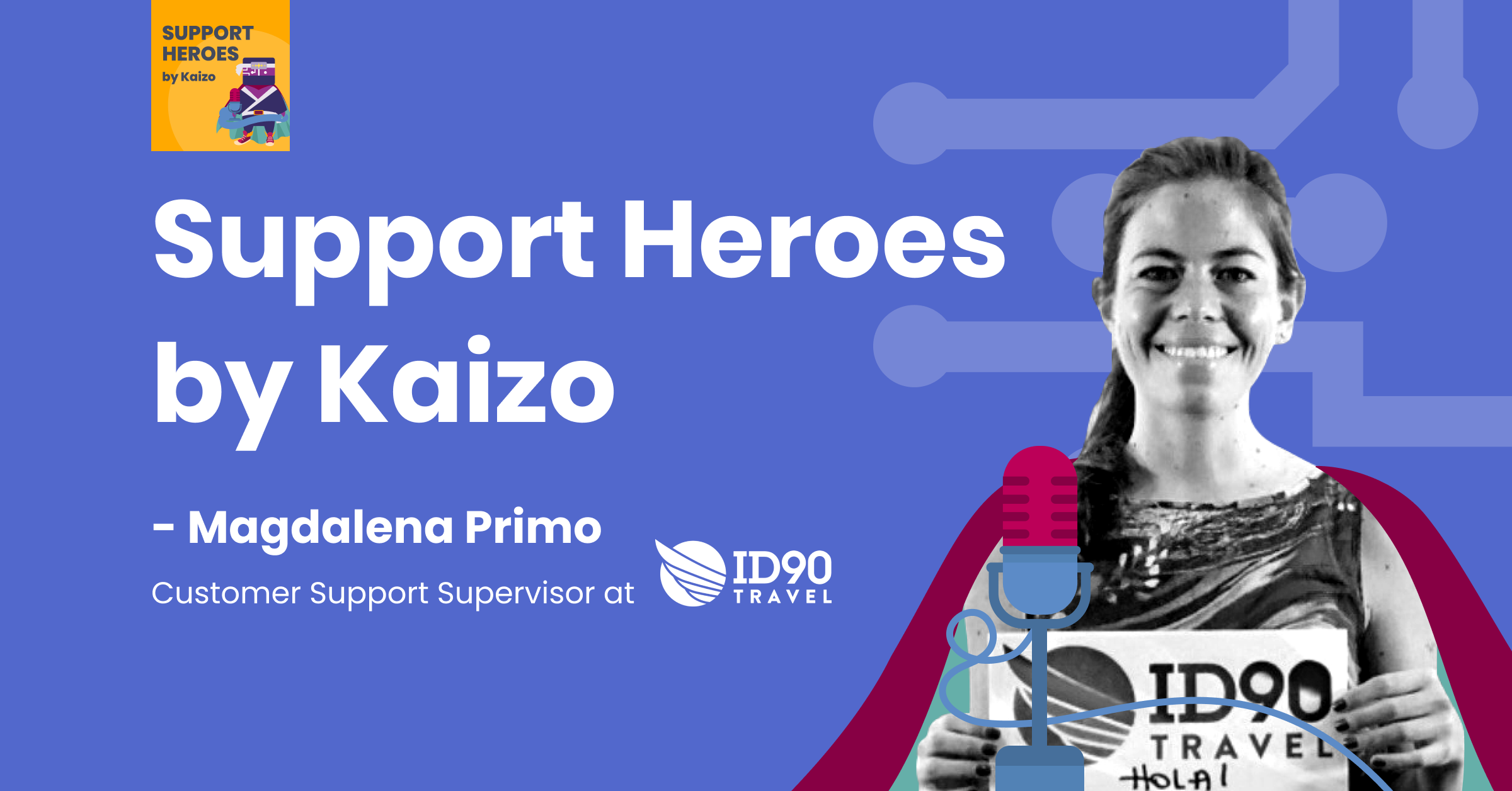Click ‘subscribe’ above to listen or download from Apple Podcast, Spotify, Google Podcast, and Amazon Music.
The eleventh release of Support Heroes by Kaizo featured Magdalena Primo – Customer Support Supervisor at ID90 Travel.
In this episode, Magdalena shares her experiences working purely off a script in a contact centre and contrasts that to the employee-centric culture that she now embodies at ID90 Travel. She documents her lessons learned and shares how she and ID90 Travel’s philosophy of supporting their employees has to lead to their team’s success. Here, we’d like to highlight the three key needs of agents noted during the episode.
Key Takeaways
1. The need for individual autonomy
2. The need for trust
3. The need for teamwork and comradery
The need for individual autonomy
“Sticking to a script was easy because you didn’t really have to get involved with what the customer was saying….”
However, Maggie found that despite the job being easier, being mandated to stick to the script and not think actually took more of a toll on her that having to invest more effort while at work to converse actively.
“It’s like you have separate self…you just answer what the company wants you to say”
“You create a different person who’s answering and you’re detached from that person. But you are human. You do have emotions. You do have other things that come to mind when a customer tells you something”
Maggie noted her detachment was sourced from her not being able to be authentic with the customer. To not be able to empathise as she would usually when talking to someone. That lack of open empathy made her feel as though she wasn’t able to help the customer..
“Being able to give this [honest] answer, being the person responsible for resolving the issue, gives you [the agent] the satisfaction of ‘yeah I did it. Goal achieved. I got this resolved.’”
This satisfaction, Maggie noted, drives the motivation for the next ticket. Being able to help people is why many people get into support in the first place, stifling this intrinsic motivation doesn’t benefit the agent or the customer.
The need for trust
“The first thing I thought was different was the trust ID90 Travel gave me to be the representative of the company even when I was not at the office and they didn’t see me more than once a month”
Putting trust in someone gives them the responsibility to do a good job and not disappoint you. You are putting your faith in them, and they feel that.
“It was a big responsibility because I was the only agent and the face of the company through those [night] hours”
“They trusted me and they knew that I could do what they asked me to do”
The ball was in Maggie’s court. She felt the weight of the task and was empowered by the fact that it was left to her. This then extended into her approach as a supervisor…
“I know I can trust my team. My job is not reviewing exactly what everyone did…it’s really easy to see when someone didn’t do what they had to’”
Constantly looking over someone’s shoulder makes them feel like you doubt them. Maggie’s team is close-knit enough, to ensure that they catch each other’s mistakes and support each other when necessary.
The need for teamwork and comradery
“I share responsibilities [with my team]. My job starts [at the point] that they can’t do something.”
“I compliment what they do. [When needed] I finish or review things and then give it back”
Maggie doesn’t see her role and an adjudicator. She supports when needed, and pitches in to help her agents on the front line. She has their back and they have hers…
“We join forces…We all have to do our part otherwise we can’t move forward”
Maggie noted that it’s important to be able to rely on one another. That being in a team in which agents can easily ask a colleague to fill a gap in their knowledge is how they succeed and take the pressure of knowledge everything off the agents.
“We all have the same initial training. We all know a little bit about what everybody [in each department] does. It gives you a perspective of what’s happening [across the company]”
“If don’t you know what’s going on behind the curtain, you’re detached from the company. But if you know [what’s going on elsewhere], you’re involved and you can give feedback”
Giving the same onboarding to every employee has proved an effective policy at ID90 Travel. With Maggie noting that the cohesion between colleagues and departments across roles directly stems from this…
“Besides the script, this is the biggest difference between my old job and this one- not knowing a single thing about the company…there’s a different kind of responsibility if you know what the processes behind [the product] are and what you need to do to get something resolved.”
“It’s better for the customer, it’s better for the agent, it’s better for the company. It works on all levels”



